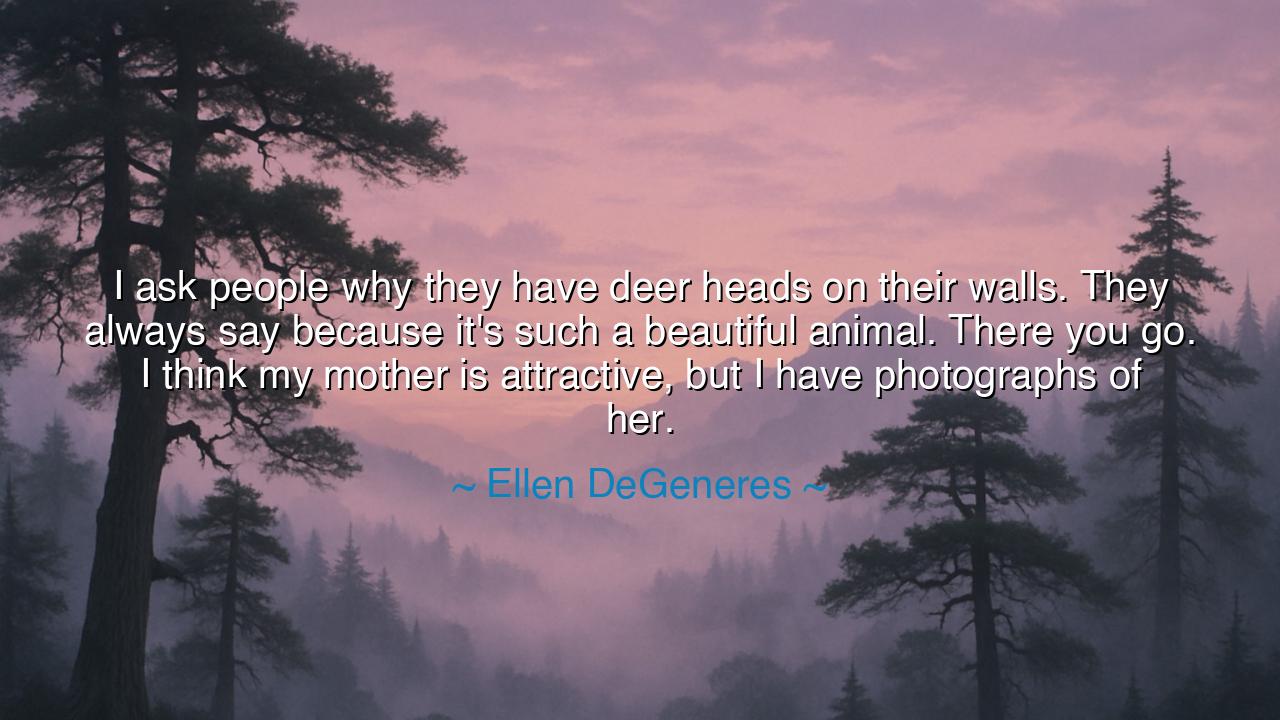
I ask people why they have deer heads on their walls. They always
I ask people why they have deer heads on their walls. They always say because it's such a beautiful animal. There you go. I think my mother is attractive, but I have photographs of her.






Hearken, O children of discernment, to the wit and wisdom concealed within the laughter of Ellen DeGeneres, who once said: “I ask people why they have deer heads on their walls. They always say because it's such a beautiful animal. There you go. I think my mother is attractive, but I have photographs of her.” Though wrapped in humor, this saying unveils a profound reflection on respect for life, human hypocrisy, and the strange justifications we invent for cruelty. Beneath the jest lies a moral truth as old as conscience itself: that admiration should not destroy what it claims to cherish.
From the dawn of civilization, humankind has been torn between wonder and dominance. The hunter’s instinct — ancient and primal — once arose from necessity, from the struggle for survival. But in times of abundance, when man no longer needs to kill for food or warmth, this instinct lingers as vanity, disguised as tradition or sport. DeGeneres, with the sharpness of a philosopher clothed in humor, exposes this contradiction. She reminds us that to call an animal “beautiful” and then slay it for ornamentation is to corrupt beauty itself. True admiration protects; false admiration destroys.
The mother in her words is no mere figure of speech, but the embodiment of love, memory, and reverence. To hang a head upon the wall is to reduce life to a trophy; to keep a photograph of one’s mother is to honor the living memory of affection. In this comparison, DeGeneres contrasts two kinds of remembrance — one born of love, the other of possession. The ancient philosophers often warned that to love something is to let it live freely. The Greeks would say, “He who loves beauty must preserve it, not conquer it.” In this, Ellen’s humor becomes a moral teaching: that reverence without compassion is no reverence at all.
History too bears witness to this lesson. The great Emperor Ashoka of India, once a conqueror drenched in blood, came upon a battlefield strewn with corpses and was seized with grief. He realized that his admiration for life could no longer coexist with destruction. Renouncing the hunt and the sword, he became a guardian of all living things. His transformation was not unlike the awakening DeGeneres calls forth — a recognition that compassion is the highest form of intelligence, and that humor, in its purest form, often serves as the gentle doorway to moral awakening.
Yet the quote also reveals a deeper irony of the human heart: we often confuse ownership with appreciation. We pluck flowers to admire them, cage birds to hear them sing, and mount antlers on our walls to celebrate their grandeur. But in so doing, we extinguish the very life that made them beautiful. The clever mother in Ellen’s jest represents wisdom — the ability to cherish beauty without possessing it. Her photograph, kept alive in memory and image, teaches that love and preservation can coexist without harm.
The lesson, therefore, is twofold. First, let admiration be guided by empathy. The beauty of a creature, a person, or a creation should inspire us to protect, not to possess. Second, let humor awaken conscience. For what Ellen achieves through jest is no less than the philosopher’s work — to make humanity look inward and see the contradictions it hides behind custom and convenience. The laughing truth she speaks penetrates where sermons cannot.
Practical wisdom flows from her words: celebrate beauty through art, photography, reverence, and protection. Let your admiration express itself in creation, not destruction. Hang paintings, not trophies; grow gardens, not graveyards. Teach your children that love is measured not by what we claim, but by what we allow to live and flourish.
And so, let the teaching endure: to truly love beauty is to honor life itself. Let not admiration become a mask for cruelty. Like Ellen DeGeneres, learn to laugh at folly, for laughter can reveal the truth where argument fails. When you next call something beautiful — a creature, a forest, a soul — remember: the truest homage is not possession, but protection. For the heart that understands this lives in harmony with all creation, and in that harmony lies the highest wisdom of the ages.






AAdministratorAdministrator
Welcome, honored guests. Please leave a comment, we will respond soon